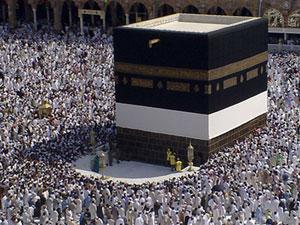What everyone should know about Ramadan
This story was originally reported by PRI’s Here and Now. For more, listen to the audio above.
Ramadan is officially underway throughout the world, which means that Muslims will be fasting from sun up to sundown throughout the month. Most people know that. Many non-Muslims, however, don’t realize is that Ramadan is big business.
Rivaled only by Christmas, Ramadan is the second biggest consumer holiday in the world, Tufts professor Vali Nasr told PRI’s Here and Now. Muslims watch a lot more television during the holiday, which means that advertising dollars go up and many stations roll out their best shows. Muslims also eat more lamb during the holiday to the extent that impacts even the exports of New Zealand and Australia. Nasr points out, “It’s a time of tremendous amount of activity and festivity.”
Fast food establishments run special deals to get people into their restaurants during Ramadan. There are even iPhone apps, including iPray and iQuran that offer beeping reminders of prayer times. They also have “mosque finder” and “find Mecca” functions that facilitate prayer among practitioners anywhere in the world.
Perhaps no country has tapped into the economic potential of Ramadan more than Saudi Arabia. “After oil,” Nasr writes for Foreign Policy, “Ramadan is Saudi Arabia’s biggest export.” That export is more than simply economic. “Saudi Arabia exports a lot of oil to the west,” Nasr told Here and Now, “it exports a lot of Islamic culture and Islamic piety to rest of the Muslim world.” Due in part to the petrodollars flowing into Saudi Arabia, “the culture of that area is seen as the ‘cool’ culture” that people want to emulate, according to Nasr. This means more strict, observant practice of Islam.
Governments now use Ramadan to score political points. “In recent years, it’s become much more a government mandated policy of policing who’s been fasting and who’s not fasting,” Nasr points out. Egypt and Indonesia have both recently cracked down on people not observing the fast.
Many leaders and tyrants have used the holiday to further their own political means. Turkmenbashi, the late leader of Turkmenistan, used the opportunity to free political prisoners. Nasr aslo points out that “Saddam Hussein, who cynically tried to style himself an Islamist during his regime’s latter years, twice made Ramadan cease-fire offers to Tehran during the Iran-Iraq War.”
For tyrants, the holiday is “a time when they have more political options in terms of things they want to do by appealing to the religious sentiments that are prevailing during Ramadan,” Nassr told PRI’s The Takeaway. “They get to wrap themselves in religious symbolism and get political capital out of it.”
The month can also be a time of tension and fighting. The Prophet Mohammed actually launched the first Muslim war in 624 during Ramadan. And sectarian fighting in Iraq has gone up during Ramadan. Nassr explained, “Religious passions sometimes during Ramadan run higher, because people are fasting, they’re more tired, and also they’re more religiously engaged.”
The holiday is changing, though, as globalization takes hold. For people living in the far north, where the time between sunrise and sunset can be unbearably long, adherents have gotten permission to observe the holiday during Mecca time. And as time passes, the holiday may change more, too.
“Here and Now” is an essential midday news magazine for those who want the latest news and expanded conversation on today’s hot-button topics: public affairs, foreign policy, science and technology, the arts and more. More “Here and Now”
Correction: This article inccorectly identified the Hajj as during Ramadan. PRI regrets the error.
Every day, reporters and producers at The World are hard at work bringing you human-centered news from across the globe. But we can’t do it without you. We need your support to ensure we can continue this work for another year.
Make a gift today, and you’ll help us unlock a matching gift of $67,000!
